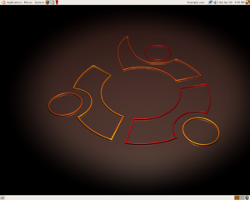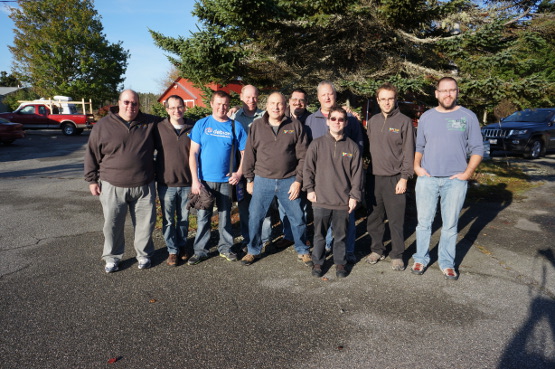What should become of Edubuntu?
First, A little background.

Edubuntu was initially created based on discussions that took place at the first Edubuntu Summit that took place in London in July 2005. The first release of Edubuntu aimed to be a turn-key solution that provided an LTSP computer lab with the best educational applications that were currently packaged in Ubuntu. It was to Ubuntu what the K12LTSP project was to Fedora, and schools around the world took advantage of the benefits that Edubuntu offered.
As time progressed, there were 3 full-time Canonical staff working on Edubuntu and Education withing Ubuntu. There was even a full time Ubuntu Education Manager. A technical problem that plagued Edubuntu since the very start was the amount of free disc space on the CD’s that were distributed. Often, funcionality or language packs had to be removed that would otherwise be in Ubuntu to make space for the programs and libraries that was shipped with Edubuntu. LTSP had become incredibly easy to install on Ubuntu, to the point that it was just an installation option from the installation CD, which impacted on the need for the turn-keyability of Edubuntu. Since the Edubuntu and the Ubuntu disc already shared about 90% of the same data, it made sense to make Edubuntu an add-on CD to Ubuntu. That way, there’s much more free space available on the installation disc, and the ease of installation of an LTSP lab wasn’t really compromised, all that was required after an Ubuntu LTSP installation was to insert the Edubuntu disc and install the required packages. Edubuntu was also adapted to Intel Classmate PC‘s and other netbooks used in education and is installable via a USB flash drive.
Current Status
Thanks to the hard work and dedication of Jordan Mantha, who has been juggling his work and his dissertation with Edubuntu work, there has been an Edubuntu release with this release of Ubuntu (Jaunty) and the previous one (Intrepid). If it wasn’t for Jordan, these releases simply wouldn’t have existed. The Canonical staff that were involved full-time either moved to other projects where they were more needed, or moved on from Canonical alltogether. Edubuntu is currently completely a community driven project with the backing of Canonical in the form of hosting, build services, bug trackers, etc, similar to the Xubuntu project. If there’s no community, there’s simply no Edubuntu at the moment. This isn’t necessarily a problem, back when we had 3 full time Canonical staffers working on the project, it certainly had an effect on the growth of our community. When there are people who are paid to do the work, then everyone assumes it will be done and they get less involved. When the involvement of the Canonical Education team was the highest in Edubuntu was when community participation dived to its lowest. Unfortunately, community participation hasn’t recovered yet. I do think however that one full-time staff member in Edubuntu would be beneficial.
From now forward
With the last few releases, I’ve been asking myself whether I really want to continue being part of Edubuntu. I haven’t been contributing, and I didn’t want to be in it half-hartedly. Yesterday I got a notification from Launchpad that my Edubuntu membership is about to expire, and I considered just deactivating my account, and then I realised that I really do want to be part of this, but it has to be pretty much all or nothing.
I believe that the Edubuntu project is neccessary and that it will add value to the education world, but in order to make it grow again we need to fix its vision and goals, and get people involved that care about the project and who wants to make Ubuntu the killer system for educational environments.
I think we need to answer the following:
- Who are our users and potential users? What do they want from us?
- What does Canonical want and expect from the Edubuntu project?
- How can we align the above with the available amount of resources, as well as find ways to increase current participation?
I’m sure that Canonical had certain goals in mind when Edubuntu was founded, and I also don’t think that the project has quite become what they have hoped it would be. I think it’s important to satisfy the needs of the users of the project as well as the sponsors.
Some people suggested that it’s better to contribute to the upstream educational projects rather than Edubuntu directly. I think fixing upstream bugs and adding features is awesome, but having a pre-packaged solution for teachers is equally cool and just as important.
I’m sending a link of this entry to the edubuntu-devel list, where I hope that Canonical will provide some answers on the future of Edubuntu. Feel free to follow and get involved in the discussions there.








Please CC me on the mailing list thread and I’ll see that the Canonical part of this gets answered
Interestingly enough, there is still interest in Edubuntu in my home country and I still get emails about it (deployments and stuff). Just a few minutes ago, I received an email pleading to update the documentation which I quote:
“The main problem for me currently is that I cannot find one definitive source of information for Edubuntu and LTSP. The handbook is really old and many things in it seem dated. Notably running local apps, which seems to have gotten easier in Edubuntu 9.04, yet all sources expect the release announcement do not seem to reflect this. But this is only one small thing that is bugging me.”
So I figured that I still receive these emails because the site itself is not updated. But I’m not blaming anyone for this. The project has lost steam when it didn’t get enough acceptance, either because the lack of resources or it just didn’t fit much into most deployments. I’ve been doing my work mostly on Sugar nowadays in my free time in my local community and we still go back to the question of “this might be more useful in an LTSP/Edubuntu” perspective.
I really planned to do a blog reply to your post but I felt this is just barking publicly and not do anything, nor expect anything at all. I would still be keen on doing my part for this project if there are clear cut goals to be set.
Just a trivia, it was actually during UDU in Sydney that the concept of Edubuntu was presented, with Jeffrey Elkner and company and I was in that meeting but it was during that sprint in London that something actually happened in terms of code and stuff because Mark prioritized it I think.
@Jerome:
Actually changes to LTSP have been release noted but in Edubuntu’s release notes, not Ubuntu’s. Though I admit I/we could have spent more time preparing it, it actually was done the night before the release and was then simply copy/pasted on Edubuntu’s website.
Most LTSP users come from the Edubuntu world even if it’s now part of Ubuntu alternate, they’re still looking for information about LTSP on Edubuntu’s website or in Edubuntu’s IRC channel.
I also admit that I’m not good at writing wiki documentation, Scott was good at maintaining it but for Jaunty I guess nobody really worked on it, would be great to find someone with time and who’s willing to update both the wiki and the handbook with latest features.
Edubuntu runs on a few schools I know. It would be a bad thing if it would disappear! Thanks for this article.
We are distributing edubuntu to children in Texas and hope to broaden our program in the coming year. In light of the lack of user-level documentation, we are developing our own curriculum and will share it with the community when we are finished.
Our team [1] mantain a educational version of Ubuntu (currently based on 9.04) called Guadalinex Edu [2][3] that is going to be used in +1500 schools, +225.000 computers and used daily by +500.000 students and teachers.
Until this release of Guadalinex Edu we were not working directly over Ubuntu base, but now that we use Ubuntu as mother distribution, we hope we can collaborate with Edubuntu project as much as possible.
We will attend to Karmic UDS in Barcelona next week to contact Edubuntu team people in order to get some advice to begin collaboration with Edubuntu project.
[1] http://www.launchpad.net/~cgateam
[2] http://www.guadalinexedu.org
[3] https://launchpad.net/guadalinexedu